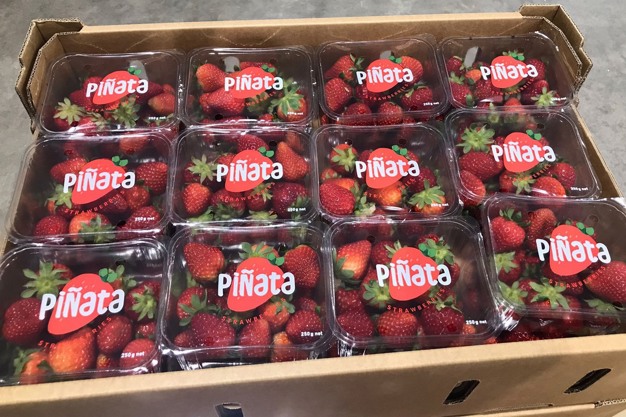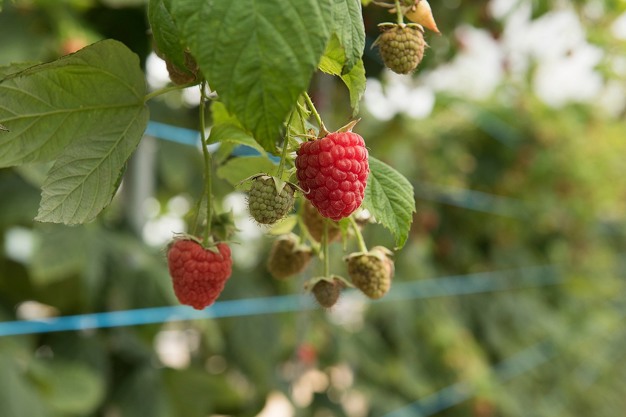While the timing of the spring strawberry and raspberry season for one major Australian fruit producer is running around 10 days late in both southern Queensland and Tasmania due to the weather, the volume and quality are still high.
"It's all looking pretty good, to be honest, and the season is looking as we had expected it in both Stanthorpe and Tasmania," Piñata Farms Managing Director, Gavin Scurr said. "Having said that, with the cooler weather we have been able to go later than we normally would here with strawberries in Wamuran. As a business, we are still on track for volume, but it is because Wamuran has enabled us to go later than normal. Usually, we are finished with strawberries by mid-October, but we have got another couple of weeks based on the weather forecast."

Mr Scurr says that his company is involved in trialling some new varieties from their alliance with BerryWorld. While the raspberry variety is predominantly Diamond Jubilee, summer production has migrated to Sweet Eve, with more varieties expected in coming seasons.
"We have some exciting strawberry varieties that we are cropping but we have some new ones that have performed even better than these ones," he said. "They're from Europe and are just out of quarantine, so we will get a look at them next year. The pipeline of the BerryWorld genetics is looking promising for us as well in both strawberries and raspberries, they're performing very well for us, especially in Tasmania. Then we have got Eves Joy which is the one that has performed great in Europe and is just out of quarantine - and it has a bigger berry size too. The bigger berry also reduces labour costs in harvesting because you are picking one berry at a time and if that berry is 10 per cent bigger it reduces your labour cost by 10 per cent. UK growers are seeing a 25-30 per cent reduction in the harvest cost of Eves Joy. We are just getting a couple of plants that we need to propagate up, so we are a few years away from commercial production. We'll have some next year to see how they handle the Australian conditions, as we are a little different to Europe. Not only are we warmer but we have more light as in we have clearer days with less cloud. Both have an impact on berry production."

Piñata Farms has also stabilised its raspberry production to have year-round supply from its three locations, which has been a great achievement according to Mr Scurr, especially with the costs involved in growing the berry compared to demand.
"The margin on raspberries across the season has become really tight as raspberries are expensive to grow," Mr Scurr said. "The harvest involves a huge amount of labour making it an expensive crop. We need demand to increase a little more before we can expand our production. At the moment there's not enough margin to warrant expanding. In saying that, leading into Christmas demand for most fruits increases and berries are no exception. Demand has been good for berries across the board, we are selling well and as an industry, we are doing a better job of producing a better product with increased shelf life and better flavour. With new season berries, the change over to the southern states increases demand too and the beginning of the crop is always the best fruit. It coincides with the Christmas demand. It is increasing, which is what we need with the cost of production rising significantly over the past four years, so we need demand to keep up with that."

Growing-wise, there have been a number of changes to infrastructure and production practices that have been implemented across the company that are helping to make it more cost-effective.
"We have shifted half of our Wamuran production up into substrate, out of the ground," Mr Scurr said. "It significantly reduces our waste fruit and water usage. It also reduces our harvest labour cost and there's less weeds. But the impediment is just the capital cost in doing that - it's a limiting factor, but each year we are converting around four hectares from the ground and elevating it into gutter production."

Pineapple production recovering, but setbacks for Honey Gold mangoes
As well as berries, Piñata Farms is also a major producer of pineapples and Honey Gold mangoes. While there is a smooth transition occurring with pineapples now from the Wamuran farm to Mareeba in North Queensland, and production has been normalising since the 2022 floods, there have been some slight hiccups with the mango season.
"Our mangoes have been a mixed bag," Mr Scurr explained. "Honey Gold is usually a reliable yielding fruit but this year it will be a lighter year. We didn't get a good flowering across most regions and then we have had a very poor fruit set. So, at this stage, it doesn't look like we will reach what we have been doing in the last 3-4 years, which have been very stable. It's unlikely we will get to same volumes as last year, but quality so far has been excellent in the regions. It's a bit early to tell how we are looking for January as the fruit is still going through the drop stage where the tree naturally aborts fruit - in the next couple of weeks we will get a clearer picture but it's looking like we might be down on normal. But overall, we are looking forward to summer, we have some good crops in berries and pineapples and while we will be down on mangoes, so will the rest of the industry, so price and demand will be okay. Barring extreme weather it should be reasonable run through to autumn."
For more information
Gavin Scurr
Piñata Farms
Phone: +61 7 5497 4295
[email protected]
www.pinata.com.au
